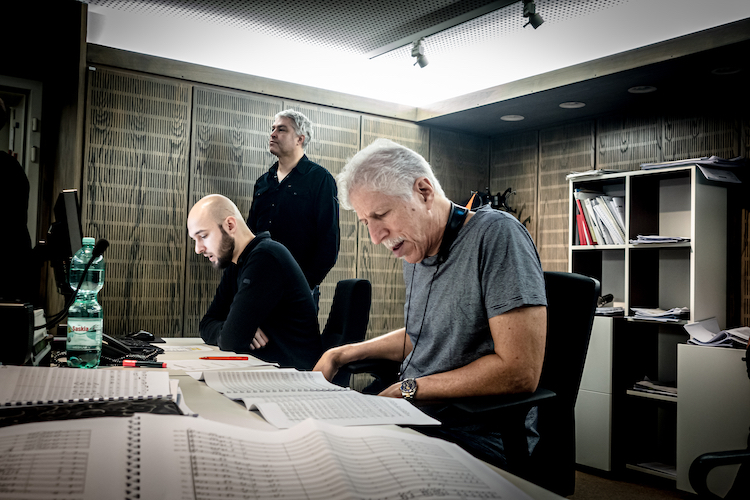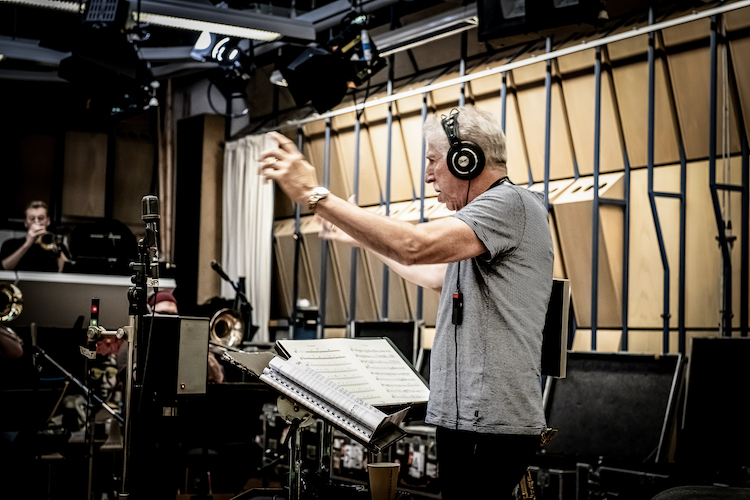SOUNDSCAPES
D 77082
listen on iTunes
watch Video
description

Bob Mintzer has the knack. Whether he picked it up during his brief stint in the Thad Jones-Mel Lewis Orchestra, his two year tenure with the Buddy Rich Big Band or his stretch with Jaco Pastorius’ Word of Mouth Big Band, the tenor sax great nurtured his instincts for orchestration and contrapuntal motion through the ‘70s and early ‘80s. His first endeavor as a leader of his own large ensemble came in 1983 when he debuted his big band at the Brecker Brothers’ popular New York City nightclub, Seventh Avenue South. Mintzer would later hone his big band arranging chops during a very fertile period with the DMP label that produced 11 acclaimed large ensemble recordings, beginning with 1985’s Incredible Journey and culminating with 2003’s Gently. By the time he took the reigns as chief conductor of the WDR Big Band Cologne in 2016, you could say that his knack for big band writing and arranging was deeply ingrained in his DNA.
Along with his ongoing big band activities, Mintzer has also been a member, since 1990, of the tight electro-acoustic jazz ensemble, Yellowjackets. Both of his worlds collided last year with the release of Jackets XL, a collaboration between the Yellowjackets and the WDR Big Band that featured seven new arrangements by Mintzer. With Soundscapes, the maestro is back leading the WDR Big Band through ten freshly arranged charts, including one ambitious reimagining of a tune he had previously recorded with his Yellowjackets colleagues back in 1991.
After presiding over a string of recordings by the WDR Big Band featuring special guests — 2018’s Meeting of Minds with the New York Voices, 2019’s Live at Philharmonie Cologne with Snarky Puppy keyboardist Bill Laurence, 2020’s Blue Soul with guitarist Dave Stryker — Mintzer was ready to showcase his own material with the world-class large ensemble. “I guess it’s a tradition over at WDR that the chief conductor at some point in his stay does a project of his own writing,” he explained. “So basically I gathered together some of the earliest things I wrote for the band over the past five years, and I also wrote a bunch of new pieces for this recording.”
An amalgam of moods, grooves and intricate textures, Soundscapes not only showcases Mintzer’s writing for this indelibly tight, universally esteemed ensemble, it also finds him doing double duty as principal soloist on tenor sax and Electronic Wind Instrument (EWI) while providing a spotlight for such other outstanding soloists as longtime WDR members Paul Heller on tenor sax, Karolina Strassmayer and Johan Hörlén on alto saxes, Ruud Breuls and Andy Haderer on trumpets and Andy Hunter on trombone. Recorded in December 2019, Mintzer’s current opus ranks among his very best in a long and distinguished career.
“I've never formally studied with anyone,” said the composer-arranger-conductor. “But I had opportunities to write in Buddy Rich’s band and it just developed from there. I think the study really is checking everything out, listening to all kinds of music and taking little snippets of ideas from the music we’re exposed to and reworking them into some sort of vocabulary.” Mintzer’s flair for counterpoint is evident throughout Soundscapes. “I love counterpoint,” he said. “I was a classical clarinet student in school and was also in an early music trio that played music from the 12th, 13th and 14th centuries. So that’s an indirect influence on my writing, while people like Thad Jones and Mel Lewis and Count Basie and all the jazz I’ve heard are a more direct influence. All these things were sort of fed into my computer and I draw upon them when I’m writing, probably subconsciously more than anything.”
The collection opens with a brand new Mintzer original, “A Reprieve.” A mellow groover that bears a touch of Black Market-era Weather Report influence, it features the leader on a Zawinul-sounding EWI while the horns dance over the bubbling groove in contrapuntal fashion. “I was sort of imagining the EWI folded into the wind section of a big band,” he explained. “That tune has an ostinato bass line that goes throughout, and that’s another thing that I really like — this sort of connecting thread of something in the groove that just keeps repeating ad nauseum while other things are stacked on top of that.” Paul Heller kicks in a potent tenor solo to spike the energy level here while the horns punctuate dramatically behind him.
Another brand new Mintzer composition, “The Conversation,” is an aptly-titled piece to describe the energized call-and-response that occurs between the dynamic horns and guest percussionist Marcio Doctor. That’s Mintzer wailing on tenor sax here while Billy Test adds a thoughtful piano solo that gradually builds to exhilarating heights. “It's a combination of Afro-Cuban, funk and African rhythms,” said the composer. “I love to blur the lines sometimes. And I think a real key component of that piece was the percussion of Marcio Doctor, who just added this beautiful flavor to the groove.” Andy Hunter also sails over the polyrhythmic fray with a brilliant trombone solo.
The straight up swinger “Stay Up” sounds like it could have come directly out of the Buddy Rich band book. As Mintzer explained, “It was uptempo but also I really like having contrast in a swing tune where it’s not just burning 4/4 the whole way but there’s a lot of variety in terms of the sound and feel. So there’s a lot of stops and starts and sort of settling and suspended sections happening throughout that tune.” The leader delivers a ferocious tenor solo over Stefan Rey’s insistent walking bass line and drummer Hans Dekker’s infectious spang-a-lang on the ride cymbal. Johan Hörlen also contributes a killer alto solo to the super-charged mix.
“Montuno,” named for the percolating, almost hypnotic groove that is at the heart of Cuban rumba, speaks of Mintzer’s seasoning on the Latin jazz scene in New York City. “I played in Tito Puente’s band for a year in 1974 and I played in a lot of salsa bands around New York prior to and after that,” he said. “And then in 1981-1982 I worked with Eddie Palmieri’s band. So I’ve played thousands of montunos in my time.” Principal soloist here on this churning, triumphant number is alto sax star Strassmayer while Mintzer is featured stretching on EWI.
The mysterious, slow grooving “Whack” was a total experiment, according to Mintzer. “I tried to just obscure any sort of habit or procedural thing I’ve ever done and just blindly started throwing notes at a score in cluster-ish sounds over this slow funk beat. I guess you could call it ‘atonal funk’ because it has this really angular 12 tone-ish melody that used woodwinds and muted brass. I was just going for something totally different.” Paul Heller solos heroically on tenor sax here and the leader stretches once again on EWI.
The rhythmically-charged, Latin-tinged “Canyon Winds” is an earlier piece by Mintzer which is meant to capture the vibe of his current California surroundings. “We live in a canyon in Los Angeles and there’s just something really magnificent and dynamic about when the wind starts blowing in our canyon and the trees kind of shimmer and shake. The energy and forward motion and power of that somehow elicited this music.” Billy Test turns in another brilliant piano solo while Andy Haderer offers a buoyant high-note trumpet solo that lifts the proceedings.
The swinging “Herky Jerky” is a perfect title for a piece imbued with the kind of stop-start forward momentum that Mintzer enjoys. “It’s based on ‘I Got Rhythm,’” he confides. “But my thinking was, again, an angular sort of stop-start kind of melody with a doctored bridge.” That’s Johan Hörlén on the scorching alto solo in the first half and Ruud Breuls adding a briskly swinging trumpet solo in the second half of the tune.
“New Look,” the lone ballad on Soundscapes, is a new Mintzer tune that features some of his most expressive and alluring tenor playing against the lush, warm-sounding accompaniment of woodwinds and flugelhorns. “I love lyricism and playing with a beautiful sound and leaving a lot of space,” said the leader of this piece that unfolds gracefully like a romantic bolero. “There’s an army of people that use a lot of notes and play with a lot of intensity. I don’t really consider myself part of that crew. I will play that way when called for but I really love leaving space and welcoming in the people I play with. I feel no need to fill up all the space. And so something slow and sustained like this piece is the perfect opportunity to really play that way.”
The swinging “One Music” is a big band adaptation of a tune Mintzer had previously recorded with the Yellowjackets as the title track to his 1991 DMP release. “I had joined the Yellowjackets in 1990 and had done four or five big band records at that point with DMP,” he recalled. “We decided the next one would be a small group recording and I was initially going to call (drummer) John Riley, (bassist) Jay Anderson and (pianist) Phil Markowitz, the guys I played with in New York at the time. But I thought, ‘I’ve been on tour with the Yellowjackets this whole time so I might just as well call them because we’ve developed this really solid relationship.’” Mintzer plays a bold tenor solo here while Billy Test kicks in a show-stopping piano solo that has him channeling his inner McCoy Tyner and Herbie Hancock.
The evocative closer, “VM,” is Mintzer’s homage to fellow composer-arranger-conductor Vince Mendoza, chief conductor of the Metropole Orkest who also presided over three projects with the WDR Big Band — 2005’s Some Skunk Funk with Randy and Michael Brecker, 2006’s Brown Street with Joe Zawinul and 2015’s Soleando with Chano Dominguez. A buoyant mid-tempo swinger, it bears a faint resemblance to Mendoza’s writing style as well as to Mintzer’s own classic tune, “Mr. Fonebone,” which he had previously recorded on 1983’s Papa Lips, 1986’s Camouflage and 2010’s Canyon Cove. “I generally take an idea and try to disguise it, just rework it,” he explained. “But in this case, part of the melody really sounds a lot like a Vince tune. So it was Vince meets Mr. Fonebone.”
That dynamic closer is capped by stellar solos from altoist Strassmayer and trumpeter Breuls, putting an exclamation point on this superb outing from maestro Mintzer and his elite crew from Cologne. — Bill Milkowski
Bill Milkowski is a regular contributor to Downbeat, Jazziz and Absolute Sound magazines. He is also the author of “JACO: The Extraordinary and Tragic Life of Jaco Pastorius” and the upcoming “Ode to a Tenor Titan: The Life and Times and Music of Michael Brecker,” to be published in October 2021.




